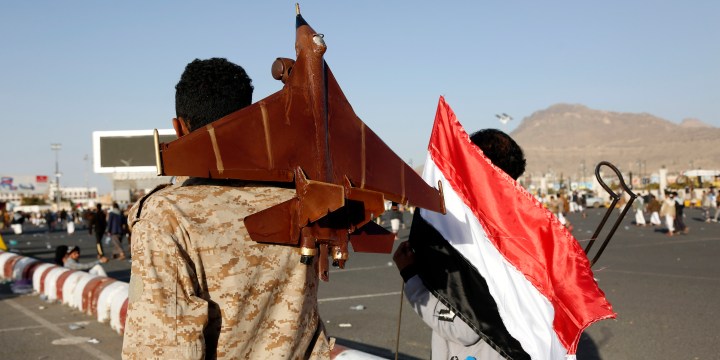MIDDLE EAST CRISIS UPDATE: 17 JANUARY 2024
US strikes four Houthi missile sites; Iran attacks ‘Israeli spy base’ in Iraq

The US hit four Houthi missile sites in Yemen in a preemptive strike on Monday, US defence officials said. The latest US action, reported earlier on Tuesday by Reuters, came as the Biden administration seeks to balance the need to deter further attacks on the Red Sea by the Iran-backed Houthi rebels against its desire to avert a wider Middle East war.
Iran attacked what it said was an Israeli spy base in Iraq with missiles in revenge for the assassination of one of its commanders in Syria, the latest sign of how the war in Gaza is spilling across Middle East borders.
The Iran-backed Hezbollah group in Lebanon and Russia-linked hackers have stepped up cyberattacks against Israel since the war with Hamas began, according to the chief technology officer of Israel-founded cybersecurity company Check Point Software Technologies.
US struck Houthi missile sites in Yemen, say defence officials
The US hit four Houthi missile sites in Yemen in a preemptive strike on Monday, US defence officials said.
The drone strikes were executed by the Air Force to prevent an imminent attack by the Iran-backed Houthis and came after two commercial ships in the Red Sea were struck by missiles in the space of 24 hours, the officials said. One of the defence officials said the planned Houthi attack threatened commercial and US Navy ships in the region.
The latest US action, reported earlier on Tuesday by Reuters, came as the Biden administration seeks to balance the need to deter further attacks on the Red Sea by the Iran-backed Houthi rebels against its desire to avert a wider Middle East war. It was a far more limited attack than the extensive airstrikes that the US and UK launched against targets in Yemen last week. President Joe Biden said the military action sent a “clear message” to the Houthis.
Read more: Biden’s ‘clear message’: How US, UK came to strike Houthis
Since Friday, the US Navy has advised vessels to stay away from the southern Red Sea, effectively closing off the Suez Canal for those who follow the guidance.
The move prompted a fresh round of trade disruptions as everything from container ships to oil and gas carriers embarked on a detour thousands of miles around the coast of Africa.
Iran hits ‘Israel spy base’ in Iraq as Middle East tensions grow
Iran attacked what it said was an Israeli spy base in Iraq with missiles in revenge for the assassination of one of its commanders in Syria, the latest sign of how the war in Gaza is spilling across Middle East borders.
The Islamic Revolutionary Guard Corps destroyed the “espionage headquarters” of Israel’s Mossad intelligence service in Iraqi Kurdistan’s Erbil late on Monday, according to a statement from the state-run Islamic Republic News Agency.
Israel’s foreign ministry declined to comment.
The assault marks the first time Tehran has publicly said it’s attacked an Israeli target since the start of the war against Hamas, which is backed by Iran and designated a terrorist organisation by the US and European Union. The ongoing conflict in Gaza, which has killed more than 24,000 Palestinians, according to Hamas authorities, has spread to involve Iran-backed militias in Lebanon, Yemen and Iraq.
Four people were killed and six others wounded in the strike, the Financial Times said, quoting Kurdish authorities. Peshraw Dizayi, a prominent local businessman who worked with real estate and security companies, was among the dead, AP reported.
Iran acted “in response to the Israeli assassination of a number of commanders of the IRGC and the resistance front”, Iran’s Tasnim news agency reported, referring to the country’s alliance of militias that includes Hezbollah and Hamas.
Iran’s foreign ministry on Tuesday said the attack was “part of” its response to those who threaten its security, without elaborating on whether there’d be more strikes.
The missile assault represented “a clear act of aggression” against his country, Iraqi Prime Minister Mohammed Al Sudani said in an interview in Davos on Tuesday.
The attack “is for sure a dangerous development that undermines the strong relationship between Iraq and Iran”, he said. “The Iraqi government maintains its right to all diplomatic and legal procedures granted to it by its sovereignty.”
Houthis hit another ship as Shell pulls tankers from Red Sea
A second commercial ship was struck by a missile in the Red Sea in the space of 24 hours and Shell halted oil tanker transits through the waterway as Houthi fighters retaliated against US and UK airstrikes in Yemen.
The Greek-owned bulk carrier Zografia was struck about 122km northwest of Al-Saleef in Yemen, according to Ambrey Analytics. On Monday, another commodity carrier, the US-owned Gibraltar Eagle, was struck in the Gulf of Aden.
Insurers seek to exclude US, UK ships from Red Sea coverage
Some ship insurers are starting to avoid covering US and UK merchant ships against war risks when they navigate the southern Red Sea, another sign of blowback since the two nations’ airstrikes on Yemen last week.
Underwriters are seeking exclusions for vessels with links to the US, UK and Israel when issuing cover for trips through the area, according to Marcus Baker, global head of marine and cargo at Marsh. It essentially means they won’t provide insurance.
“Underwriters are adding clauses saying no US, UK or Israeli involvement,” he said. “Just about everybody is putting something like that in, and many include the words ‘ownership’ or ‘interest’.”
It’s the latest development showing the fragile security situation in the southern Red Sea, where Western naval forces have warned that it’s unsafe for merchant shipping to pass.
Hezbollah ‘steps up cyberattacks on Israel’
The Iran-backed Hezbollah group in Lebanon and Russia-linked hackers have stepped up cyberattacks against Israel since the war with Hamas began, according to the chief technology officer of Israel-founded cybersecurity company Check Point Software Technologies.
“While a lot of the war right now is with Hamas, actually the entity that has the strength in cyberspace is Iran,” Check Point’s Dorit Dor said in an interview on the sidelines of the World Economic Forum in Davos. “And Iran is activating Hezbollah.”
Hackers on both sides of the conflict have sought to disrupt their opponents’ digital capacity since fighting started on 7 October. Israeli targets have seen a 20% increase in cyberattacks since then, with the figures rising to 50% for defence-linked companies, according to Dor.
While attacks have become more frequent, the tactics being deployed — including distributed denial-of-service attacks and intelligence-gathering efforts — weren’t novel, she said.
“There is an increase in play from Russia” targeting Israel, although it wasn’t clear if those attacks were state-backed or opportunistic, Dor said.
Israel’s war budget navigates politics with markets on edge
Israeli Prime Minister Benjamin Netanyahu’s Cabinet approved a revised state budget for 2024 that became bogged down in political wrangling and unnerved investors worried about the government’s fiscal path during the war against Hamas.
A 70 billion-shekel ($19-billion) surge in expenditure and an estimated drop of 36 billion shekels in revenues will push this year’s deficit to 6.6% of gross domestic product, a shortfall that would be among the widest for Israel this century. Defence spending alone will go up by 55 billion shekels.
The National Unity Party led by Netanyahu’s political rival Benny Gantz, who joined the government after Hamas’s 7 October attacks, voted against the budget during a session on Monday that was delayed by disagreements.
Two-state solution needed to finance rebuilding Gaza, says Qatar
Financial aid to rebuild Gaza will be hard to attract unless the key issue of a two-state solution for the Palestinians and Israelis is properly addressed, Qatar’s prime minister said.
Some international pledges to provide funding for the Mediterranean enclave in previous years had not materialised because “most countries don’t believe in the sustainability of the situation”, Sheikh Mohammed Bin Abdulrahman Al Thani said at the World Economic Forum in Davos on Tuesday.
“Gaza is not there any more,” he said, referring to the devastation caused by Israeli strikes on the territory since the start of the war against Hamas on 7 October. It’s unlikely “you will see all countries coming back and injecting funds to reconstruct it, unless we address the real issue, which is the two-state solution”.
The international community’s response to the conflict in Gaza had been “very disappointing” for the region and its people, Al-Thani said. “Even calling for a ceasefire has become a controversial term.” DM
Read more in Daily Maverick: Israel-Palestine War




Comments - Please login in order to comment.